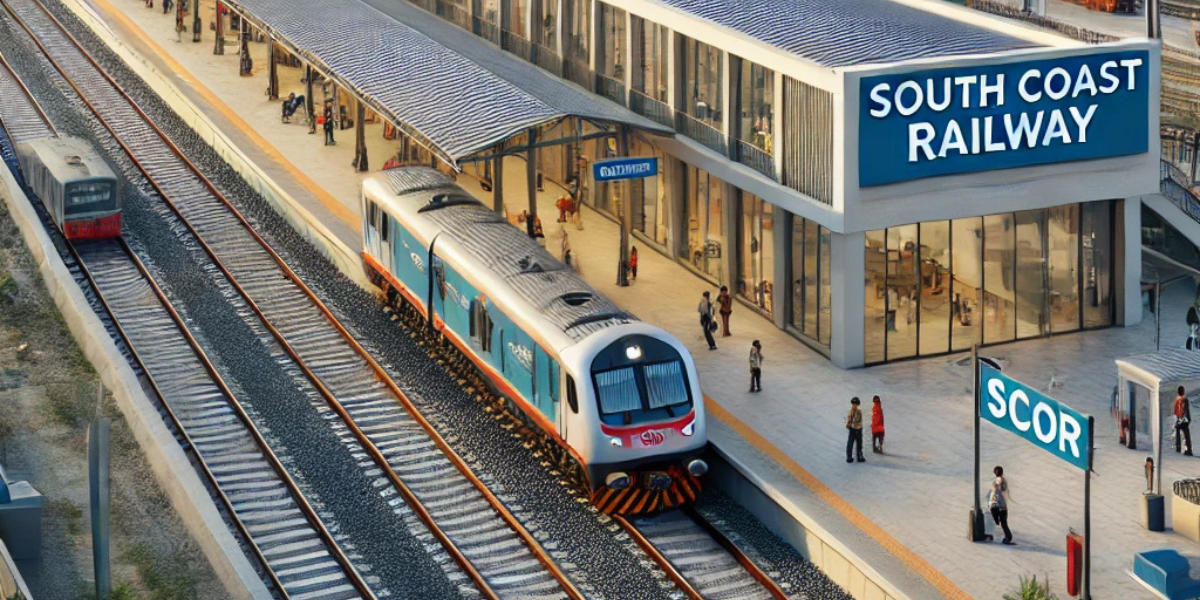On 8 January 2025, the Prime Minister laid the foundation stone for the construction of the SCoR headquarters. The Union Cabinet gave post-facto approval to the final detailed project report, with partial modifications, on 7 February.
Published Feb 15, 2025 | 1:53 PM ⚊ Updated Feb 15, 2025 | 1:53 PM

After over a decade, the South Coast Railway Zone has been confirmed (AI generated)
Synopsis: Prime Minister Narendra Modi laid the foundation stone for the South Coast Railway Zone’s headquarters at Visakhapatnam in January 2025, after a delay of more than a decade. The zone, once operational, is likely to propel agricultural and industrial growth in the region. It is also expected to enhance the logistics thanks to its proximity to the Visakhapatnam and Krishnapatnam ports.
The South Coast Railway (SCoR) Zone, with its headquarters in Visakhapatnam, is finally taking shape after a delay of more than a decade.
Originally promised in 2014 under the Andhra Pradesh Reorganisation Act, the new zone was meant to address the state’s railway needs following its bifurcation. However, despite assurances of swift action, the project remained stalled for years.
After a delay of over a decade, Prime Minister Narendra Modi laid the foundation stone for the SCoR headquarters in January 2025.
The new zone is being carved out of the East Coast Railway (ECoR) and South Central Railway (SCR), with major changes in jurisdiction. While the government has highlighted the benefits of this restructuring, including improved efficiency and economic growth, questions remain about its timing.
Critics argue that the Union government’s decision to move forward is politically motivated, pointing to the recent change in power in Andhra Pradesh, where an NDA ally has taken charge.
The Union government promised a separate railway zone for Andhra Pradesh over a decade ago.
As per the Andhra Pradesh Reorganisation Act (2014), the Union government listed the railway zone as a promise under the 13th Schedule.
“Indian Railways shall, within six months from the appointed day, examine establishing a new railway zone in the successor State of Andhra Pradesh,” it read under the “Infrastructure” subheading.
It also assured that the Railways would be expeditious in the process, an assurance that didn’t come to pass until 11 years later.
On 17 February 2019, the Government of India announced the creation of SCoR, with its headquarters in Visakhapatnam. The Union Cabinet approved the detailed project report on 28 February 2019. However, there was no progress until 2025.
On 8 January 2025, the Prime Minister laid the foundation stone for the construction of the SCoR headquarters. The Union Cabinet gave post-facto approval to the final detailed project report, with partial modifications, on 7 February.
The formation of SCoR involves bifurcating the Waltair Railway Division, which currently belongs to the East Coast Railway.
A portion of the Waltair Division will be merged into the newly established Visakhapatnam Railway Division under SCoR, while the remaining part will constitute a new Rayagada Division under the ECoR. This change will alter the operational jurisdiction of ECoR, potentially shifting freight revenue sources and management structures.
Similarly, the Vijayawada, Guntur, and Guntakal divisions, currently part of the South Central Railway, will be incorporated into the SCoR. This will lead to a reduction in SCR’s operational territory and jurisdiction, affecting the administrative control over certain routes in Andhra Pradesh.
The restructuring is expected to decongest SCR and allow it to focus on core routes in Telangana and Maharashtra.
The bifurcation of the Waltair Railway Division has sparked concerns among railway employees, freight operators, and local stakeholders.
Waltair, a major revenue-generating division under the East Coast Railway, has been split into two parts: one being integrated into the new Visakhapatnam Railway Division under SCoR and the other forming the Rayagada Division under ECoR. This division has raised concerns regarding revenue distribution, as Waltair contributes significantly to freight earnings due to its proximity to ports and industries. In 2024, it brought in about ₹10,000 crore in revenue.
Employees fear administrative and job restructuring, while some stakeholders worry about potential disruptions in operations during the transition.
The move aims to streamline operations and improve regional railway management, but its long-term success depends on effective coordination between the newly created divisions and their parent zones.
The establishment of the South Coast Railway (SCoR) zone is anticipated to bring several benefits to the region. One significant advantage is the potential for enhanced suburban railway development.
Additionally, the reorganisation is expected to result in better infrastructure development, including the construction of more platforms at Visakhapatnam and the implementation of a bulb line near Visakhapatnam to prevent train detentions at Kancharapalem Outer.
The new zone is expected to bring significant benefits to the region, including improved connectivity and the introduction of more trains. This would facilitate both passenger and freight transportation. Furthermore, the reorganisation of existing divisions under SCoR is anticipated to improve administrative control and service delivery.
